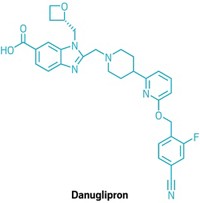Advertisement
Grab your lab coat. Let's get started
Welcome!
Welcome!
Create an account below to get 6 C&EN articles per month, receive newsletters and more - all free.
It seems this is your first time logging in online. Please enter the following information to continue.
As an ACS member you automatically get access to this site. All we need is few more details to create your reading experience.
Not you? Sign in with a different account.
Not you? Sign in with a different account.
ERROR 1
ERROR 1
ERROR 2
ERROR 2
ERROR 2
ERROR 2
ERROR 2
Password and Confirm password must match.
If you have an ACS member number, please enter it here so we can link this account to your membership. (optional)
ERROR 2
ACS values your privacy. By submitting your information, you are gaining access to C&EN and subscribing to our weekly newsletter. We use the information you provide to make your reading experience better, and we will never sell your data to third party members.
People
Drug Development Deal Sours For University, Biotech Firm
UCLA and Medivation, once happy partners, now confront each other in court
by Michael McCoy
April 18, 2014
| A version of this story appeared in
Volume 92, Issue 16
Partnerships between universities and corporations are billed as a great way to turn academic discoveries into useful products and therapies, but a dispute between the University of California, Los Angeles, and a biotech firm shows they can easily turn ugly.
On April 11, UCLA filed a lawsuit against San Francisco-based Medivation accusing the company of withholding promised profits on a cancer drug discovered by UCLA researchers. The suit follows by less than 18 months a court case in which Medivation claimed that UCLA withheld lucrative drug candidates.
The adversaries were all smiles when they joined forces in September 2005. Medivation licensed more than 160 small molecules created and patented by UCLA chemistry professor Michael E. Jung using a screening method developed by Charles L. Sawyers, another UCLA professor. Sawyers’s method identified molecules that could help treat late-stage, treatment-resistant prostate cancer.
Medivation developed one of the UCLA molecules into a prostate cancer treatment that the Food & Drug Administration approved in 2012. The drug, named Xtandi, reaped $392 million in sales last year.
Unbeknownst to Medivation, in May 2009 Jung and Sawyers formed Aragon Pharmaceuticals to develop similar molecules from Jung’s lab that were not in the patents covering the compounds licensed to Medivation. The drug company sued, claiming that it should have been given a chance to license the similar molecules as well, but in late 2012 a California Superior Court judge sided with UCLA and dismissed the case.
Johnson & Johnson acquired Aragon for $650 million last year. Aragon is currently testing one of the non-Medivation molecules as a prostate cancer treatment in a late-stage clinical trial.
And the bad blood between UCLA and Medivation continues. In the lawsuit filed earlier this month, UCLA claims that its 2005 agreement with Medivation entitles it to 10% of the operating profits on Xtandi. Medivation denies the allegation.
Jonathan L. Kennedy, a chemist and attorney at the law firm McKee, Voorhees & Sease, expects to see more cases pitting former industry and academic partners. “There’s a collaborative aspect to these agreements, but at the same time there’s an adversarial aspect. The latter can be minimized with good licensing,” he says.





Join the conversation
Contact the reporter
Submit a Letter to the Editor for publication
Engage with us on Twitter